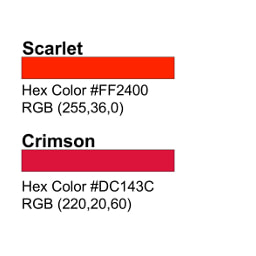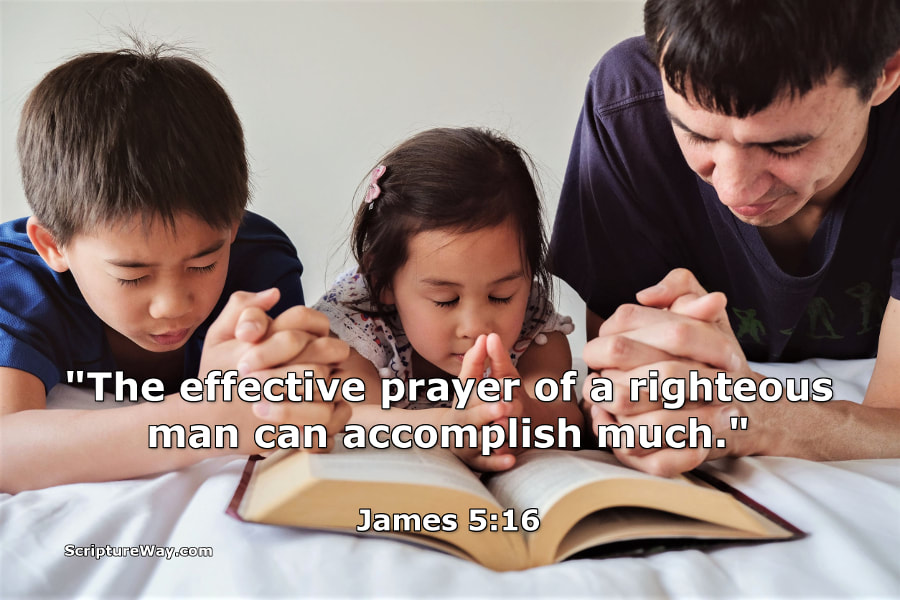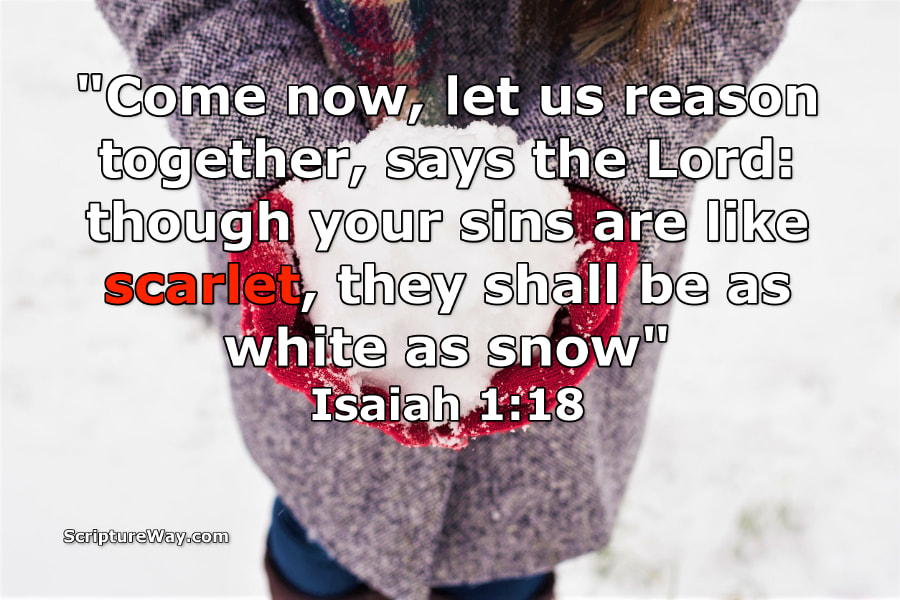This article presents five Biblical keys to effective prayer -- pray with other Christians, pray in faith, confess your sin, pray according to the will of God, and pray in the name of Jesus. This article also discusses the results of effective prayer.
Introduction
Prayer is one of the most important topics we will ever discuss as Christians. Prayer is communication with God. Prayer helps us receive God's peace and healing in the midst of our problems and concerns. Prayer helps us discern God's will for our lives. Prayer encourages others, protects others, and empowers others to further the ministry of Christ in the world.
It is to our advantage to learn to pray effectively. Why? Because "The effective prayer of a righteous man can accomplish much" (James 5:16). The Bible gives us guidance in how to pray effectively. Keys to Effective Prayer1. Pray with other Christians
James 5:14 instructs us, "Is anyone among you sick? Then he must call for the elders of the church and they [third person plural] are to pray over him, anointing him with oil in the name of the Lord" (James 5:14, brackets added).
Of course, God hears our prayers when we are alone and are praying in secret (Matthew 6:5-6). However, Scripture also teaches us that it is advantageous for us to pray with our companions in Christ. Recall that Jesus sent out his disciples in pairs (Mark 6:7). He gave them [third person plural] authority over unclean spirits, with the results that they cast out many demons, anointed sick people with oil, and healed them (Mark 6:13). 2. Pray in faith
James 5:15 tells us, "And the prayer offered in faith [Greek word pistis, which means persuasion, come to trust] will restore the one who is sick, and the Lord will raise him up, and if he has committed sins, they will be forgiven him" (James 5:15, brackets added, Ref. 1). When we pray in faith, God is pleased because we believe that "He is" and that "He is a rewarder of those who seek Him" (Hebrews 11:6). Note that faith, "divine persuasion," is a gift that God gives to believers (Ephesians 2:8-9, Ref. 1, Acts 16:14).
3. Confess your sin and receive forgiveness
This teaching -- that confession of sin is a prerequisite for effective prayer -- may seem strange to some, even Christians. However, this key cannot be overlooked if we are to pray effectively.
John writes about confessing our sins to God, "If we confess our sins, He is faithful and righteous to forgive us our sins and to cleanse us from all unrighteousness" (1 John 1:9). When we harbor unforgiven sin, or anger or unforgiveness towards others, that sin can block the channel of God's power through us in our prayers. Refer to Matthew 5:22-24, Matthew 6:14-15, James 1:20, and Psalm 66:18. To become effective prayer channels for God when we minister to others or pray for ourselves, we should first take time to confess our sins and to receive God's forgiveness through God's Son, Jesus Christ (1 John 1:7, 9). 4. Pray confidently according to the will of God
John tells us, "This is the confidence [bold resolve] which we have before Him, that, if we ask anything according to His will [God's desire, preferred will], He hears us" (1 John 5:14, brackets added, Ref. 2, Ref. 3).
Praying in God's will includes trusting God with the outcome. Recall that Jesus said to his Father, "Not My will, but Yours be done" (Luke 22:42). As believers in Christ and as children of our heavenly Father (John 1:12), we can learn God's will through prayer (speaking with and listening to God), God's word, and the guidance of the Holy Spirit (John 16:13). If we do not know God's will in a matter, we should ask him (James 1:5). 5. Pray in the name (character and authority) of Jesus
Jesus said to his disciples (and by extension to us as believers), "Whatever you ask in My name, that will I do, so that the Father may be glorified in the Son. (14) If you ask Me anything in My name, I will do it" (John 14:13-14).
When we pray in Jesus' name, we pray representing his character, reputation, and authority. We pray representing Christ, not ourselves (Ref. 4). Praying in Jesus' name should not be just a religious phrase we tack on at the end of our prayers. We should discern God's will and then pray our entire prayer in Jesus' name -- in his behalf and for his glory. The Results of Effective Prayer
Before we close this lesson, let's gain further insight by looking at two word definitions in James 5:16. The New American Standard Bible (1995) says, "The effective prayer of a righteous man can accomplish much" (James 5:16, NASB1995).
In James 5:16 the Greek word for effective in "effective prayer" is the verb energeó. Energeó means energizing, working, and displaying activity (Ref. 5). HELPS Word-studies illustrates this term by the example of "an electrical current energizing a wire, bringing it to a shining light bulb" (Ref. 5). Like the wire that brings electrical energy to turn on a light bulb, our effective prayers are channels for God's energy and power to work change in situations for others. The James 5:16 scripture also tells us our effective prayers can accomplish much. The Greek word translated as can accomplish much is ischuó. Ischuó means to prevail, to engage the resistance with combative, confrontive force to achieve what the Lord gives us faith to achieve (Ref. 6). Our effective prayers engage the resistance. Finally, a word about trusting God. Many times when we pray fervently for others we will see improvements including peace and healing. However, sometimes when we pray in faith and apply all the keys in prayer that God has given to us, the results may not come quickly or turn out the way we hope. In those situations we must continue to trust God. God helps us through all of life's difficulties, and for believers in Jesus Christ, God will ultimately bring us into his presence in heaven.
1 Comment
"Blessed is the one whose transgression is forgiven, whose sin is covered. Blessed is the man against whom the Lord counts no iniquity, and in whose spirit there is no deceit." (Psalm 32:1-2)
"Pardoning mercy is of all things in the world most to be prized, for it is the only and sure way to happiness." -- Treasury of David (Ref. 1)
This article teaches the seriousness of transgression, sin, and iniquity from Psalm 32:1-2 as well as the blessedness of forgiveness through the atonement of Christ.
Consider. True happiness comes not from the world, nor through "self help," but from God's forgiveness of our sins through the atonement of Christ.
The Blessedness of Forgiveness
Psalm 32:1 begins with an exclamation in the form of an interjection. The opening phrase could be translated "Oh! How blessed is the one whose transgression is forgiven!" (Ref. 2) The Hebrew word for blessed is esher, which is a forceful interjection that means "How happy!" (Ref. 3) David is so joyful that he repeats the exclamation, "Oh! How blessed," again in verse 2. "Blessed is the man against whom the Lord counts no iniquity, and in whose spirit there is no deceit" (Psalm 32:2). Note that true happiness of forgiveness comes from God, not from man.
The word for "man" in Psalm 32:2 is adam, which means mankind, including men, women, and children (Ref. 4). The Threefold Picture of Sin
Psalm 32:1-2 employs three words for sin -- "transgression," "sin," and "iniquity." All three are serious. These words describe the compass of sin and its foulness (Ref. 2). Let's take them in the order described by David, the psalmist.
Transgression defined
Psalm 32:1 says "Blessed is the one whose transgression is forgiven." The Hebrew word for transgression means rebellion (Ref. 5). We commit a transgression against God when we know, or our conscience knows, what God's law teaches, and we go ahead and do the deed anyway.
Sin defined
The Hebrew word for sin written in Psalm 32:1, chataah, means great sin. Chataah occurs only eight times in the Old Testament (Ref. 6, Genesis 20:1-9; Exodus 32:1-4, 19-21).
A similar Hebrew word for sin, chata, occurs more than 200 times in the Old Testament and means do wrong, commit a mistake, or miss the mark or goal (Strong's Exhaustive Concordance Ref. 7, Exodus 20:18-20, Psalm 4:4). Iniquity defined
The Hebrew word for iniquity is avon, which means moral evil (Ref. 8). "'Iniquity' is defined as being wicked or immoral in nature or character. Primarily, it indicates 'not an action, but the character of an action,' and is so distinguished from 'sin'" (Ref. 9). We commit iniquity when we not only rebel against God and miss the mark, but also waver or diverge from the straight path manifest in God's law (Ref. 2).
The Threefold Picture of Forgiveness
Psalm 32 verses one and two describe three aspects of forgiveness - "forgiven," "covered," and "not counted (not imputed)." Let's take each aspect in the order presented.
Forgiveness defined
Psalm 32:1 begins, "Blessed is the one whose transgression is forgiven ..." When God forgives our sins, he lifts them up and carries them away. The Hebrew word for forgiven means to lift, carry away, and bear (Ref. 10).
In the Old Testament, on the annual day of atonement, the scapegoat (literally, goat of removal) carried away the sins of the people into the wilderness (Leviticus 16:7-10, Leviticus 16:29-30, Ref. 11). In the New Testament, Jesus Christ, the Lamb of God, is the one who takes away our sin (John 1:29). Jesus Christ takes away our sin not just annually but once and for all time (Hebrews 9:11-12). "He himself bore our sins in his body on the cross, so that we might die to sins and live for righteousness; by his wounds you have been healed" (1 Peter 2:24). Sin covered
"Blessed is the one whose transgression is forgiven, whose sin is covered" (Psalm 32:1, italics added). The Hebrew word for cover means to hide or conceal (Ref. 12). For the believer in Christ, God hides our sin, covers it with a merciful veil, so it no longer comes into his view as evidence against us (Ref. 2). Christ's atonement is the covering for our sin (Ref. 2).
Iniquity not imputed
Psalm 32 verse 2 in the English Standard Version (ESV) begins, "Blessed is the man against whom the Lord counts no iniquity ..." The Hebrew word for count means impute, charge, or reckon (Ref. 13). Even though our iniquity (moral evil) has been ugly, when we believe in and trust our Lord and Savior Jesus Christ, he does not impute to us (charge us for, take into account, or reckon) that iniquity (Ref. 13).
How Do We Receive the Blessedness of Forgiveness?The blessedness of forgiveness can be known only through the atonement of Christ
Isaiah 53:5 - "But he was pierced for our transgressions; he was crushed for our iniquities; upon him was the chastisement that brought us peace, and with his wounds we are healed."
1 Peter 1:18-19 - "... knowing that you were ransomed from the futile ways inherited from your forefathers, not with perishable things such as silver or gold, but with the precious blood of Christ, like that of a lamb without blemish or spot." 1 John 2:2 - "He is the atoning sacrifice for our sins, and not only for ours but also for the sins of the whole world." We receive forgiveness by acknowledging our sin and confessing our sin to God
Psalm 32:5 - "I acknowledged my sin to You, And my iniquity I have not hidden. I said, 'I will confess my transgressions to the Lord,' And You forgave the iniquity of my sin."
1 John 1:8-9 - "If we say that we have no sin, we deceive ourselves, and the truth is not in us. If we confess our sins, He is faithful and just to forgive us our sins and to cleanse us from all unrighteousness." True happiness (blessedness) comes only through the forgiveness and removal of our sin by Christ, not from anything the world provides.
Apply. Do you want to receive the blessedness of forgiveness for your sins? Acknowledge your sins, and confess your sins to Jesus Christ (1 John 1:9). He will lift away the guilt and pain of your sin and will heal you. You will receive the true happiness of knowing by faith that you are pardoned forever by Christ.
References
1. https://biblehub.com/commentaries/tod/psalms/32.htm 2. https://biblehub.com/commentaries/maclaren/psalms/32.htm 3. https://biblehub.com/hebrew/835.htm 4. https://biblehub.com/hebrew/120.htm 5. https://biblehub.com/hebrew/6588.htm 6. https://biblehub.com/hebrew/2401.htm 7. https://biblehub.com/hebrew/2398.htm 8. https://biblehub.com/hebrew/5771.htm 9. https://www.christianity.com/wiki/sin/what-is-iniquity-meaning-and-importance-in-the-bible.html 10. https://biblehub.com/hebrew/5375.htm 11. https://biblehub.com/hebrew/5799.htm 12. https://biblehub.com/hebrew/3680.htm 13. https://biblehub.com/hebrew/2803.htm
"Come now, let us reason together, says the Lord: though your sins are like scarlet, they shall be as white as snow; though they are red like crimson, they shall become like wool." (Isaiah 1:18)
This lesson is the first in a series on the "Comes" of God's word. This lesson describes God's invitation in Isaiah 1:18, "Come now, let us reason together, says the Lord: though your sins are like scarlet, they shall be as white as snow."
Consider. In Isaiah 1:18-20 (Old Testament), God's forgiveness was conditional on the people's obedience to God. How do people today receive God's forgiveness now that Christ has paid the penalty for sin?
Introduction
Being accused of having hands full of blood was a serious accusation. Yet, that is exactly how the Lord accused the people of Judah and Jerusalem (Isaiah 1:1) in Isaiah 1:15, "Even though you make many prayers, I will not listen; your hands are full of blood." Having hands full of blood is a symbol for the cruel wrongs the people had committed including the guilt of actual murder (Isaiah 1:21, Ref. 1). Isaiah had already spoken against the people for their rebellion against God (Isaiah 1:2) and for the insincerity of their sacrifices, offerings, festivals, and prayers (Isaiah 1:11-15).
Come Now
In Isaiah 1:18, God says "Come now." The Hebrew word for come is halak, which means to go, come, walk (Ref. 2). Here in Isaiah 1:18 "Come" is a summons for the recipient of the message to approach the speaker (God). Although God does not force the people of Judah and Jerusalem to come to him, God strongly urges the people to come to him that they might receive his pardon. Likewise, today God strongly urges all sinners to come to him.
Let Us Reason Together
The Hebrew word for let us reason together, yakach, means to decide, adjudge, prove, and argue (Ref. 3, Job 13:15). The idea is that of a legal process in which each party maintains his own case (Ref. 4, Isaiah 43:26). God proposes to present to the people of Judah and Jerusalem the principles on which he is willing to forgive their sins and bestow his pardon (Ref. 5). God describes the terms for pardon in Isaiah 1:18-20.
Though Your Sins Are Like Scarlet The Crimson or Scarlet Worm (Ref. 7) The Crimson or Scarlet Worm (Ref. 7)
The stain of the people's sins are bright red and indelible like the scarlet dye used by the ancients. The ancients made scarlet and crimson dyes from the dried bodies of the insect (worm), Coccus ilicis found on oak trees in Spain and in the countries east of the Mediterranean (Ref. 5, Ref. 6, Ref. 7).
When it was time for the female Coccus ilicis to give birth, she would attach herself permanently to an oak tree. Her body protected her eggs until the larvae were hatched and able to live on their own. As the mother died, she oozed a crimson fluid which stained her body and the surrounding wood. The death of the female Coccus ilicis paints a picture of the death of Christ who sacrificed his blood on the wood of the cross that others, by believing in him, may live (Ref. 7, Ref. 8).
The scarlet dye was indelible. Cotton material was dipped in this color twice so the stain was permanent (Ref. 5). The stain of the red dye (and likewise the stain of sin in the human heart) could not be washed away by man alone. That is why we as sinners need God's action to wash us clean.
The scarlet dye was known since early in the Old Testament times, centuries before the prophet Isaiah. For further study, I suggest you check these additional references for scarlet in the Bible:
They Will Be White as Snow
Only God can forgive sin. Only God can cleanse people and wash away their sin. David recognized this principle. He prayed to God, "Have mercy on me, O God, according to your steadfast love; according to your abundant mercy blot out my transgressions. Wash me thoroughly from my iniquity, and cleanse me from my sin!" (Psalm 51:1-2). David also wrote, "Wash me, and I shall be whiter than snow" (Psalm 51:7). White symbolizes innocence and purity (Ref. 9). "White as snow " is "a powerful figurative description of the result of forgiveness" (Ref. 10 below).
Though They Are Red Like Crimson, They Shall Be as Wool Scarlet and Crimson Colors (Ref. 11) Scarlet and Crimson Colors (Ref. 11)
Scarlet and crimson are similar reddish colors. Scarlet is bright red with an orange tint. Crimson is a strong, bright, deep red color combined with some blue or violet, resulting in a small degree of purple (Ref. 11). Crimson is associated with the stain of blood (Isaiah 1:15, Ref. 12). The ancients employed crimson color to dye wool (Ref. 5).
The Hebrew word for red in the phrase "red like Crimson" is adom, which means glaring, flagrant in Isaiah 1:18 (Brown-Driver-Briggs, Ref. 13). Though their sins are flagrant and appear as deep stains, God, upon their repentance and reformation, will remove their sins so they will be like wool restored to its original, undyed whiteness (Ref. 14). Forgiveness - By Obedience or by Faith?
In the Old Testament, God's relationship with man was based on obedience to God. Isaiah confirms this point in regard to God's forgiveness. In Isaiah 1:18 God offers forgiveness and cleansing to the people of Judah and Jerusalem. However, God's forgiveness and cleansing was conditional based on their willingness to obey God. Isaiah 1:19-20 describes the conditions for God's forgiveness, and the consequences for not obeying God. "If you are willing and obedient, you shall eat the good of the land; but if you refuse and rebel, you shall be eaten by the sword; for the mouth of the Lord has spoken" (Isaiah 1:19-20, italics added). For further study on God's relationship with man in the Old Testament based on obedience, I suggest reading Deuteronomy 30:15-20.
In the New Testament, God's relationship with man is based on faith in Christ. The Apostle Paul writes, "For by grace you have been saved through faith. And this is not your own doing; it is the gift of God" (Ephesians 2:8). Faith in Christ means believing in, trusting in, and having confidence in Christ (Ref. 15). Peter preached to the Gentiles gathered in Cornelius' house that through the name of Jesus everyone who believes in him receives forgiveness of sins (Acts 10:34-43). God's power to cleanse our sins "white as snow" is through the blood of Christ (1 John 1:7). Summary - Main Principles
Let's review the main principles in this lesson:
1. God invites all sinners to come to him that we might receive his pardon (Isaiah 1:18). 2. The stain of sin is red as scarlet (Isaiah 1:18). 3. Only God can wash our sins white as snow (Isaiah 1:18, Psalm 51:7). As a result of Christ's death, we know that it is the blood of Jesus that cleanses us from all sin (1 John 1:7). 4. In the Old Testament, God's forgiveness was conditional on the people's obedience to God (Isaiah 1:18-20). In the New Testament, God provides forgiveness and cleansing through faith in Christ (Ephesians 2:8, Acts 10:43).
Apply. If you do not know Christ, come to him, confess your sin, and ask him to forgive you. Put your faith and trust in him and walk in the cleansed life that Christ has given you. If you do have faith in Christ as your Savior, walk with him in the light. Thank him for forgiving your sin and for cleansing you from all unrighteousness (1 John 1:7-9).
Related Lessons
"God's Great Invitation - Come, Satisfy Your Thirst" (Isaiah 55:1) "Jesus' Invitation - Come to Me and Rest" (Matthew 11:28-30)
References
1. https://biblehub.com/commentaries/cambridge/isaiah/1.htm Cambridge Bible for Schools and Colleges - Isaiah 1:15 2. https://biblehub.com/hebrew/1980.htm 3. https://biblehub.com/hebrew/3198.htm 4. https://biblehub.com/commentaries/cambridge/isaiah/1.htm Cambridge Bible for Schools and Colleges - Isaiah 1:18 5. https://biblehub.com/commentaries/barnes/isaiah/1.htm Barnes' Notes on the Bible - Isaiah 1:18 6. https://www.biblegateway.com/resources/encyclopedia-of-the-bible/Scarlet 7. https://www.discovercreation.org/blog/2011/11/20/the-crimson-or-scarlet-worm/ 8. https://studybible.info/strongs/H8438 9. https://www.biblegateway.com/resources/encyclopedia-of-the-bible/White 10. The NIV Study Bible, Zondervan Bible Publishers, 1985, note on Isaiah 1:18 11. https://en.wikipedia.org/wiki/Shades_of_red 12. https://biblehub.com/commentaries/ellicott/isaiah/1.htm Ellicott's Commentary for English Readers - Isaiah 1:18 13. https://biblehub.com/hebrew/119.htm 14. https://biblehub.com/commentaries/jfb/isaiah/1.htm Jamieson-Fausset-Brown Bible Commentary - Isaiah 1:18 15. https://biblehub.com/greek/4102.htm |
Daily Bible Verse(Click the link above) AuthorMr. Whitney V. Myers. Christian. For more information, please visit the Author Page. Posting ScheduleI plan to provide new postings about once a month. Planned Topics(subject to change) Recent Posts(most recent three months) Popular Posts(top 10) Categories
All
Archives
July 2024
|
|
Copyright 2018-2024 Whitney V. Myers |
Listed in Feedspot's Top 100 Bible Study Blogs and Websites |



 RSS Feed
RSS Feed
